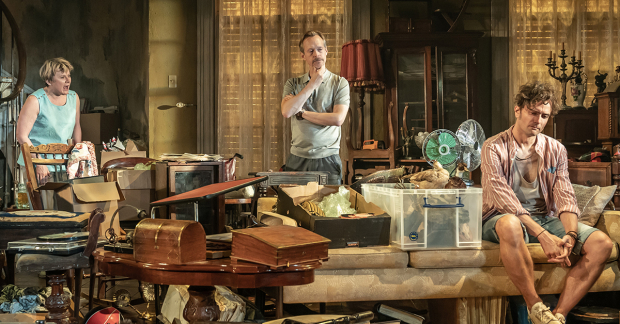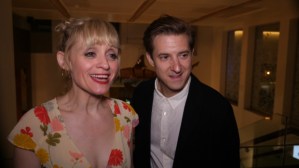Review: Appropriate (Donmar Warehouse)
Ola Ince directs the UK premiere of Branden Jacobs-Jenkins’ play

© Johan Persson
The dog days of August used to be a lousy time for London theatre. But now off-West End is the place to be. Hot on the heels of Robert Icke's devastatingly good The Doctor at the Almeida, comes this at the Donmar Warehouse – the British premiere of a play from Branden Jacobs-Jenkins, a young star of American playwriting.
This play too takes an old form to reveal new truths. But Jacobs-Jenkins doesn't adapt a single play but an entire genre – the American family drama – creating a new family, the Layfayettes, to rival the brawling, squabbling, endlessly-talkative clans imagined by O'Neill, Albee, Hansberry, and Tracy Letts among many others, and consciously appropriating scenes and ideas from other writers in the genre.
That's only the first kind of appropriation in this bracingly clever play, as twisted and pointed as a corkscrew, tautly and sensitively directed by Ola Ince. Viciously funny and profoundly unsettling, it opens with Franz (a wonderfully loose-limbed and twitchy Edward Hogg) climbing in through the window of his dead father's plantation home, due to be auctioned off in a matter of days. He's accompanied by his very young fiancée River (an intense and still Tafline Steen) and he's arrived with a purpose – to see the family from whom he has been estranged for more than a decade.
Jacobs-Jenkins springs many surprises as his drama runs its suspenseful and gripping course; suffice it to say that nothing really goes well. Franz's arrival triggers a series of blistering confrontations with his angry, monstrous sister Toni (Monica Dolan), single mother to a "f**k-up" of a son, and his uptight, anxious brother Bo (Steven MacKintosh), who is accompanied by his family: his Jewish wife Rachael, and children, eight year-old Ainsley and 13 year-old ("I'm almost an adult") Cassidy.
On Fly Davis's crumbling rubbish heap of a set, where the tattered detritus of their father's life is piled under an old chandelier and faded pillared grandeur, secrets are spilling and long buried resentments rising to the surface, even before the discovery of a book of horrific photographs of dead black people after they have apparently been lynched.
From the moment of their revelation, these disturbing photographs haunt the play, each character revealing something of themselves by their attitudes towards them. To Bo, they represent the possibility of financial gain, to Cassidy (a brilliantly off-hand Isabella Pappas) they are something to share with your friends on Instagram. Rachael wants to use them as a lesson about the racial history of the American south, Franz as a way of finding absolution. Toni is simply terrified of them for the truth they may or may not reveal about the father she idolised.
Among many other things, Appropriate is a ghost story: it is as much defined by absence as by presence. It opens with the sound of cicadas, wound in Donato Wharton's evocative and scary soundscape, into a cacophony that is both insistent and impossible to understand. The house in which the action takes place is next to a graveyard; in a wood nearby is a circle of land where the plantations' slaves were buried. History is everywhere, eating into the souls of the characters, affecting their views without them even knowing it.
Jacobs-Jenkins, who is African American and whose previous plays include Gloria and An Octoroon, never makes explicit all the feelings that resonate from this fact. But he does, at the start of his play text, quote Susan Sontag. "No 'we' should be taken for granted when the subject is looking at other people's pain." This unsettling sense permeates the action: nothing can be taken for granted. It is constantly finding darkly comic expression as when Mackintosh's Bo reveals an entire life of privilege and prejudice in his assumptions about River's racial background; it takes on darker hues as the full extent of the father's beliefs is revealed.
Throughout Jacobs-Jenkins exhibits an extraordinary balance of control and wildness; for all its debt to other dramas that feature families full of fear and loathing, this one has a tone and concerns all of its own. It's a magnificent achievement and all the performances rise to the occasion. Dolan is just extraordinary as Toni, so cruel and foul you loathe her, but never losing sight of the sadness behind her anger and Mackintosh similarly captures the boiling emotion behind Bo's urbane surface, all twitches and tightness and nervous breathing. "I didn't enslave anyone," he cries. Jacobs-Jenkins leaves the denial hanging. What a writer he is!



















